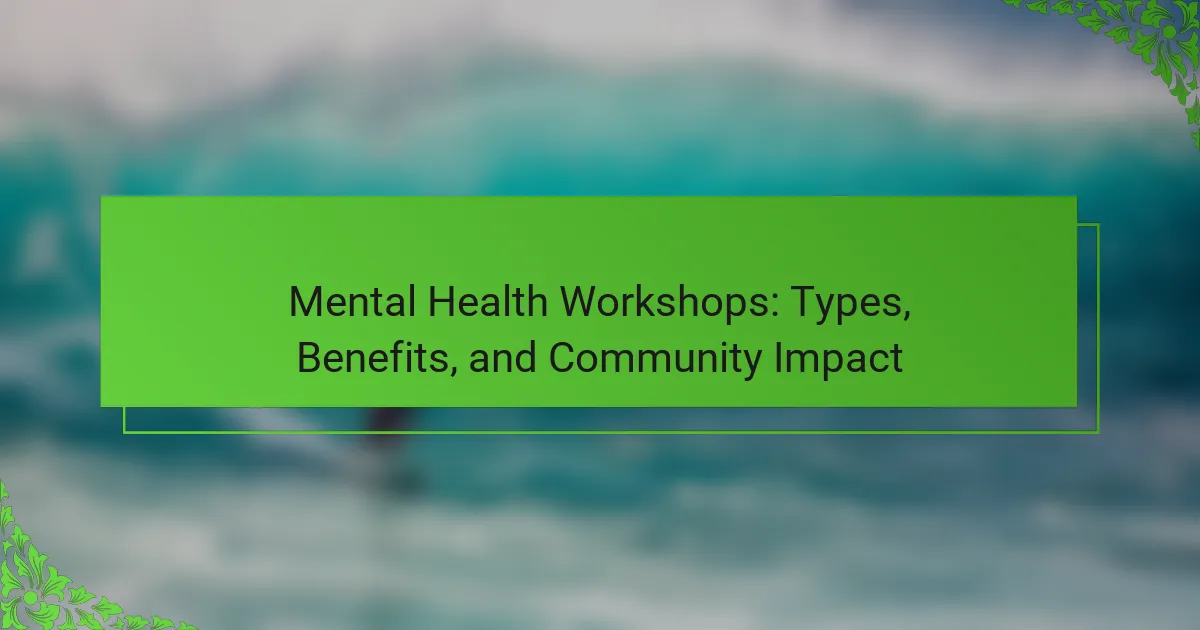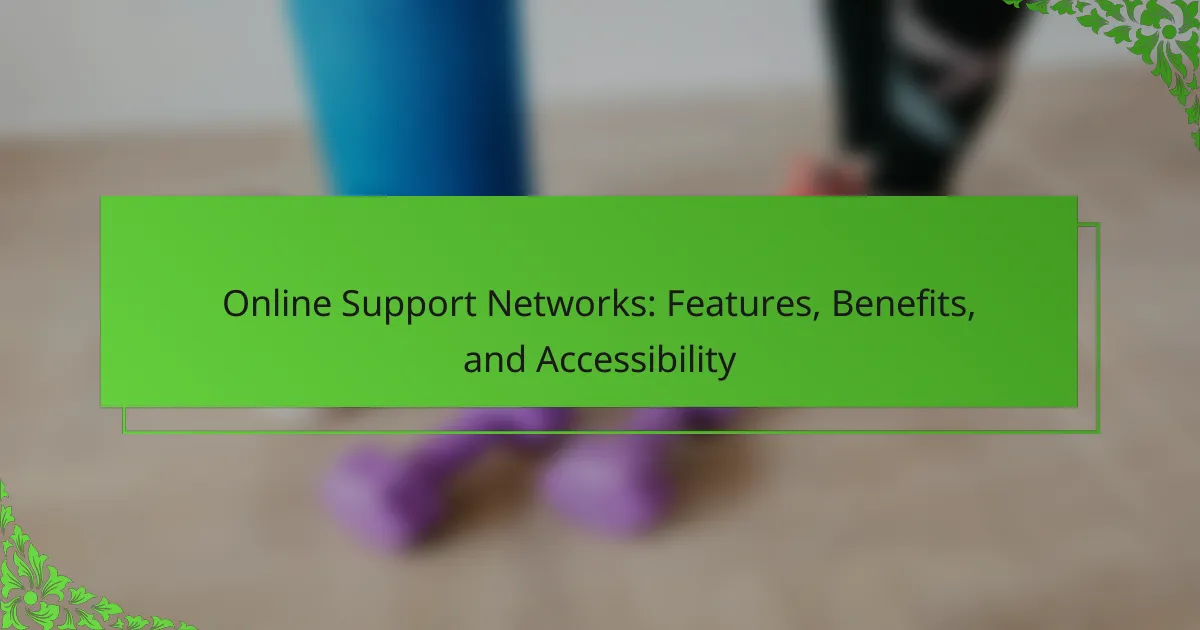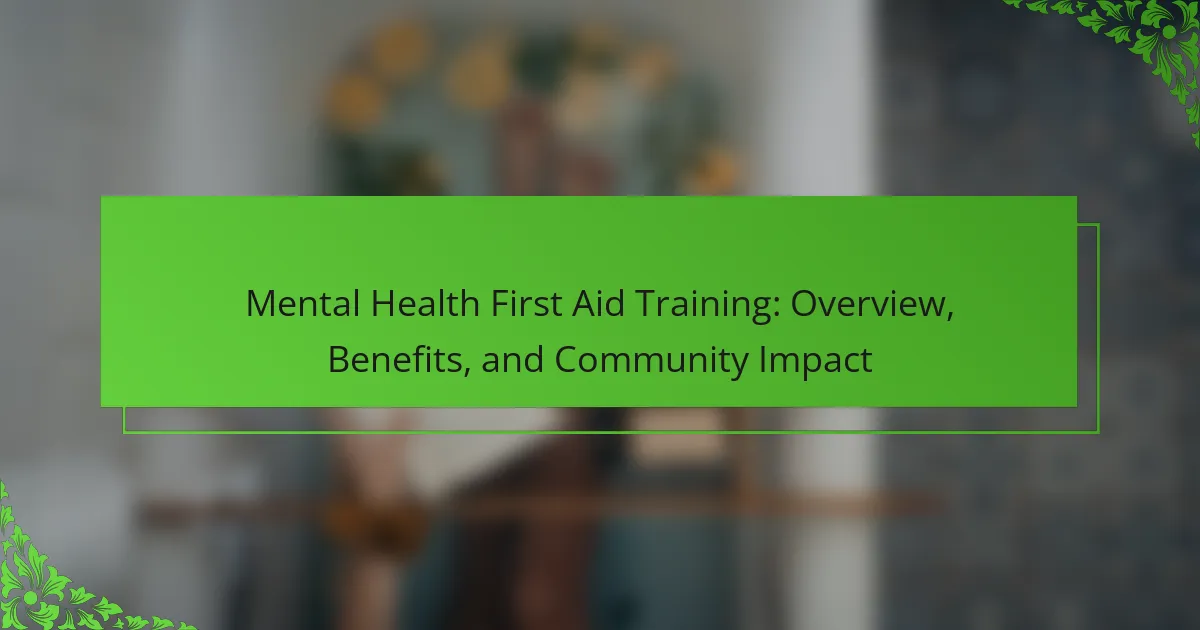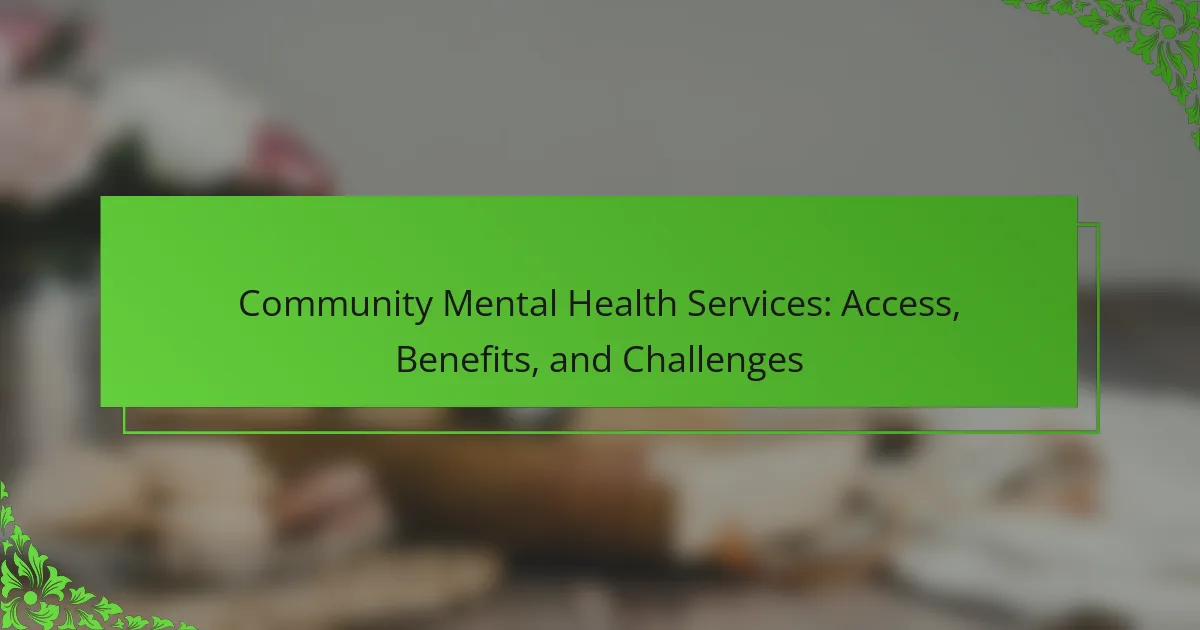Mental health workshops play a crucial role in enhancing awareness and providing coping strategies for individuals and communities. This article explores various types of workshops, their benefits for personal growth, and their impact on community support. It also addresses cultural influences on participation and the challenges facilitators face in creating engaging and effective sessions. Finally, we will discuss key elements for organizing successful mental health workshops that resonate with diverse audiences.
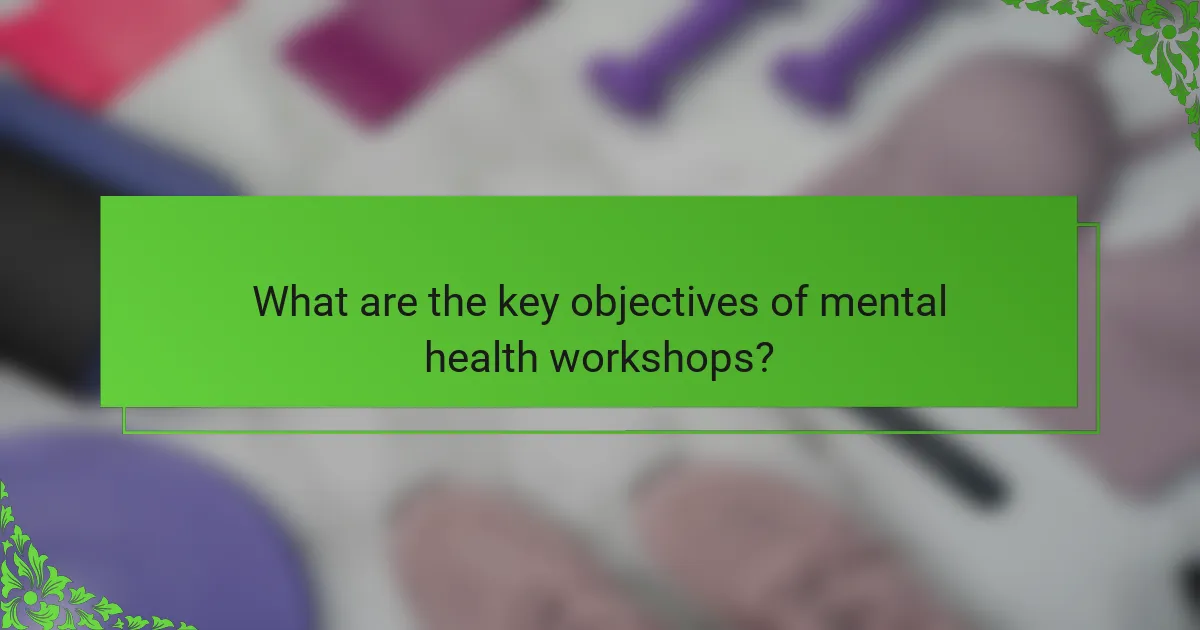
What are the key objectives of mental health workshops?
The key objectives of mental health workshops include enhancing awareness, fostering coping strategies, and promoting community support. These workshops aim to educate participants about mental health issues, reduce stigma, and provide tools for managing stress and anxiety. They also encourage open discussions, creating a supportive environment that strengthens community bonds. Ultimately, these workshops strive to improve overall mental well-being and resilience among attendees.
How do mental health workshops enhance personal well-being?
Mental health workshops significantly enhance personal well-being by providing tools for emotional resilience and coping strategies. They foster a supportive environment where individuals can share experiences and learn from each other. Participants often report improved self-awareness and reduced anxiety levels. Workshops may include activities like mindfulness exercises, which promote relaxation and stress management. Additionally, these sessions can strengthen community bonds, creating networks of support that extend beyond the workshop setting.
Which skills are developed through participation in workshops?
Participation in mental health workshops develops skills such as emotional regulation, active listening, and stress management. These workshops foster personal growth, enhance communication abilities, and build resilience. Participants often gain insights into mental health challenges, promoting empathy and understanding within their communities. Additionally, teamwork and collaborative problem-solving skills are frequently strengthened through group activities.
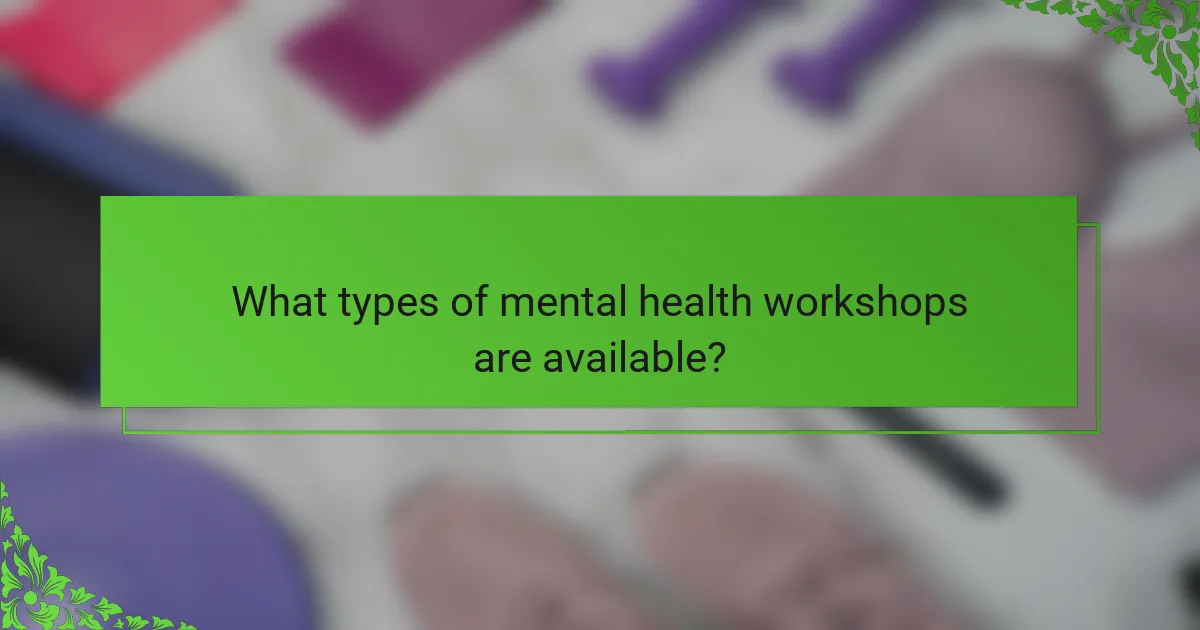
What types of mental health workshops are available?
Various types of mental health workshops are available, focusing on different needs and approaches. Common types include stress management workshops, mindfulness training, cognitive behavioral therapy (CBT) sessions, and support groups. Each type offers unique benefits, such as skill development, emotional support, and community building. These workshops can enhance individual well-being and foster a supportive community environment.
How do therapeutic workshops differ from educational workshops?
Therapeutic workshops focus on emotional healing, while educational workshops emphasize knowledge acquisition. Therapeutic workshops often include activities like group discussions and art therapy, promoting mental well-being. In contrast, educational workshops provide structured learning experiences, covering topics such as coping strategies or mental health awareness. The primary goal of therapeutic workshops is personal growth, whereas educational workshops aim to equip participants with specific skills or information. Both types contribute positively to community mental health, yet they serve distinct purposes.
What are the formats of workshops (in-person vs. online)?
Mental health workshops can be conducted in two main formats: in-person and online. In-person workshops facilitate face-to-face interactions, fostering community engagement and immediate support. Online workshops offer flexibility and accessibility, allowing participants to join from various locations, which can enhance participation rates. Each format has unique benefits, such as the personal touch of in-person sessions versus the convenience of online platforms.
Which specific topics are commonly covered in workshops?
Mental health workshops commonly cover topics such as stress management, mindfulness techniques, emotional resilience, coping strategies, and the importance of community support. These workshops aim to enhance participants’ well-being and foster a supportive environment.
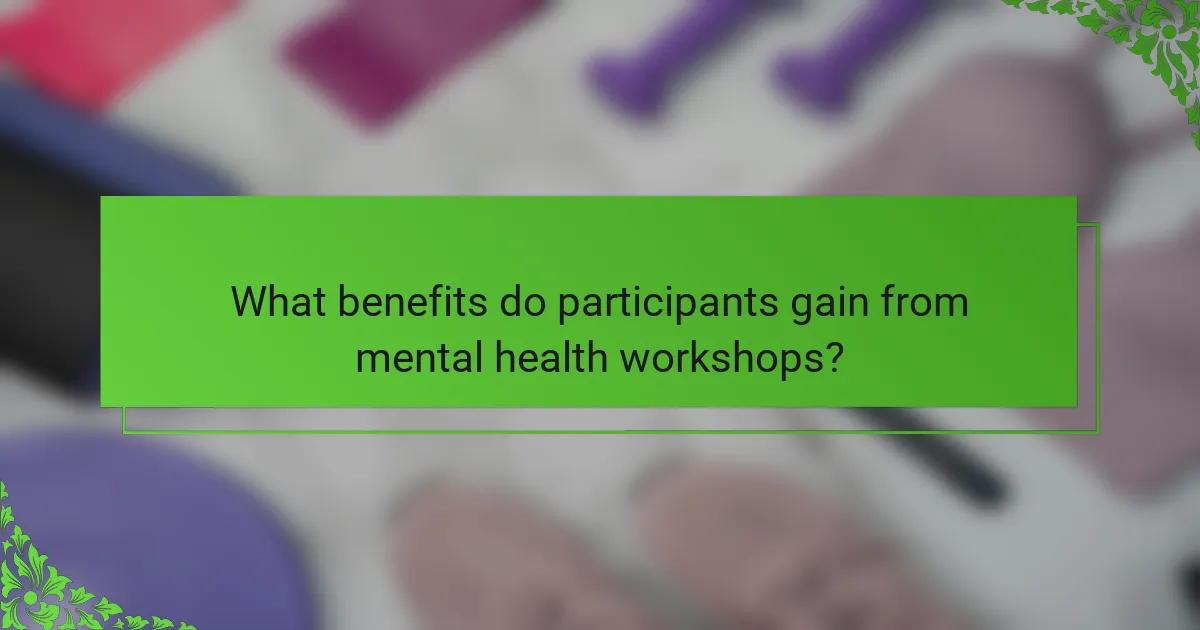
What benefits do participants gain from mental health workshops?
Participants gain improved emotional regulation, enhanced coping strategies, and increased awareness of mental health issues from mental health workshops. These workshops foster community support and provide valuable resources for personal growth. Participants often report reduced stigma and a greater sense of belonging. As a result, mental health workshops significantly contribute to overall community well-being.
How do workshops foster community connections?
Mental health workshops foster community connections by creating safe spaces for open dialogue and mutual support. Participants engage in shared experiences, enhancing empathy and understanding. These workshops often facilitate networking opportunities, leading to lasting friendships and support systems. The collaborative environment encourages collective problem-solving and resource sharing, strengthening community ties.
What impact do workshops have on reducing stigma around mental health?
Mental health workshops significantly reduce stigma by fostering open discussions and increasing awareness. These workshops provide safe spaces for participants to share experiences, learn about mental health, and challenge misconceptions. Studies show that communities with regular workshops report a 30% increase in understanding and acceptance of mental health issues. This impact is crucial in creating supportive environments that encourage individuals to seek help.
Which long-term benefits can arise from consistent participation?
Consistent participation in mental health workshops can lead to improved emotional resilience, enhanced coping strategies, and stronger community connections. Participants often report reduced anxiety and depression levels over time. These workshops foster a supportive environment, promoting long-term mental well-being. Additionally, regular engagement can enhance self-awareness and personal growth, contributing to overall life satisfaction.
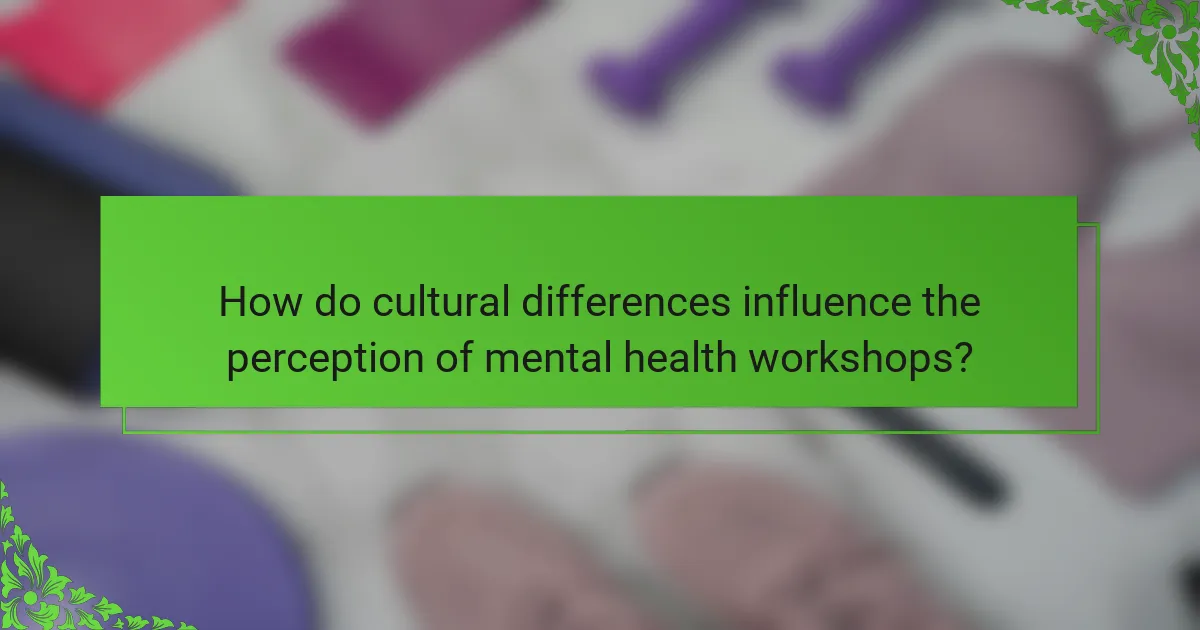
How do cultural differences influence the perception of mental health workshops?
Cultural differences significantly shape the perception of mental health workshops. These workshops may be embraced or resisted based on cultural norms and beliefs regarding mental health.
In collectivist cultures, community-oriented approaches in workshops may be more effective, emphasizing group support and shared experiences. Conversely, in individualistic cultures, personal empowerment and self-expression might be prioritized, impacting the workshop’s structure and messaging.
Furthermore, stigma surrounding mental health varies across cultures, influencing attendance and participation. In some cultures, openly discussing mental health can be taboo, leading to lower engagement in workshops.
Understanding these cultural nuances allows for tailored workshop designs that respect and incorporate diverse perspectives, enhancing their effectiveness and community impact.
What regional approaches are taken in mental health education?
Regional approaches in mental health education vary widely, focusing on community needs and cultural contexts. For instance, in North America, workshops often emphasize trauma-informed care, while European models may prioritize integrative mental health strategies. In Asia, mental health education frequently incorporates traditional practices alongside modern techniques. Latin America tends to focus on community-based interventions that engage local resources. These regional differences highlight unique attributes of mental health workshops, enhancing their effectiveness and community impact.
How do community needs shape workshop content and delivery?
Community needs significantly influence workshop content and delivery by ensuring relevance and engagement. Workshops tailored to specific community concerns foster participation and address local mental health challenges. For example, integrating local resources and cultural considerations enhances effectiveness. Feedback from community members shapes topics, formats, and delivery methods, making workshops more impactful and accessible. Additionally, collaboration with local organizations can provide valuable insights into community dynamics, further refining content to meet diverse needs.
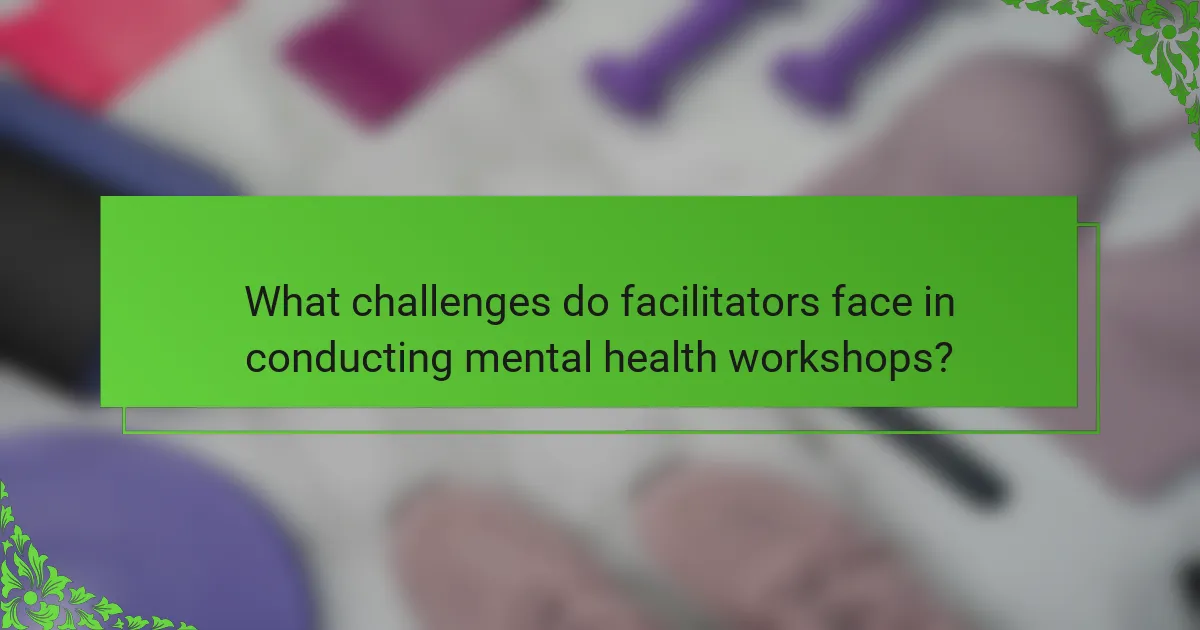
What challenges do facilitators face in conducting mental health workshops?
Facilitators face various challenges in conducting mental health workshops, including participant engagement, diverse needs, and stigma. Engaging participants can be difficult, especially when addressing sensitive topics. Facilitators must tailor their approaches to meet the diverse needs of attendees, which can vary significantly. Additionally, overcoming stigma surrounding mental health can hinder open discussions, impacting the workshop’s effectiveness. These challenges require facilitators to adapt their strategies and foster a supportive environment.
How can facilitators effectively engage diverse audiences?
Facilitators can effectively engage diverse audiences by employing inclusive strategies tailored to individual needs. Utilizing varied teaching methods, such as interactive activities and multimedia resources, caters to different learning styles. Creating a safe environment encourages open dialogue and participation. Additionally, incorporating culturally relevant examples fosters connection and relatability. Regular feedback helps facilitators adjust their approach, ensuring all voices are heard and valued.
What strategies can be employed to measure workshop effectiveness?
To measure workshop effectiveness, employ participant feedback, pre-and post-workshop assessments, and observation. These strategies gauge knowledge retention, satisfaction, and behavioral changes.
Participant feedback provides insights into perceived value and areas for improvement. Pre-and post-workshop assessments measure knowledge gain and skill application. Observation allows facilitators to assess engagement and interaction levels during the workshop.
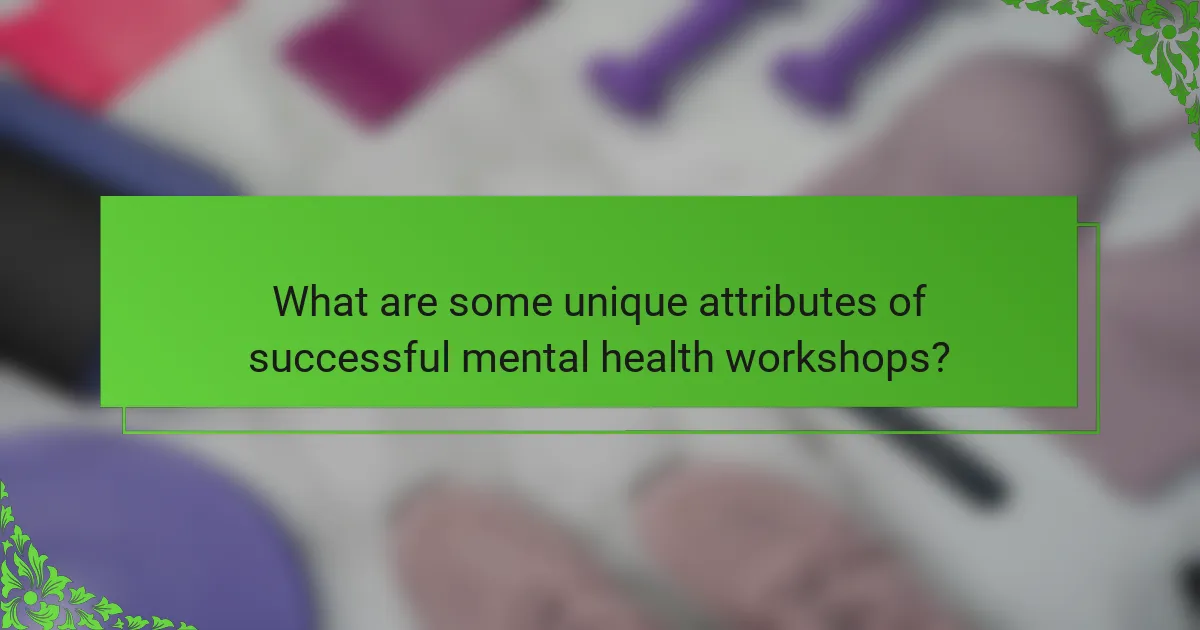
What are some unique attributes of successful mental health workshops?
Successful mental health workshops often feature engaging activities, expert facilitators, and personalized support. These unique attributes enhance participant experience and foster community connections.
Workshops that incorporate interactive elements, such as role-playing or art therapy, encourage deeper engagement. Expert facilitators with specialized training provide valuable insights and create a safe environment. Personalized support, including follow-up resources, addresses individual needs and promotes lasting impact.
Additionally, workshops that focus on specific populations, such as youth or veterans, tailor content to unique challenges, increasing relevance and effectiveness. This combination of factors contributes to the overall success and positive community impact of mental health workshops.
Which innovative techniques are used to enhance participant engagement?
Interactive activities, technology integration, and personalized content enhance participant engagement in mental health workshops. Techniques like role-playing, virtual reality simulations, and tailored discussions foster connection and active participation. Gamification elements, such as challenges and rewards, also motivate attendees to engage more deeply. These innovative approaches promote a supportive environment, improving overall outcomes and community impact.
What role do guest speakers play in enriching the workshop experience?
Guest speakers enhance the workshop experience by providing expert insights and diverse perspectives. Their real-world experiences foster deeper understanding and engagement among participants. They can share unique strategies, tools, and stories that resonate with attendees, making the content relatable and actionable. Additionally, guest speakers often inspire participants to explore new ideas and approaches to mental health, enriching the overall learning environment.
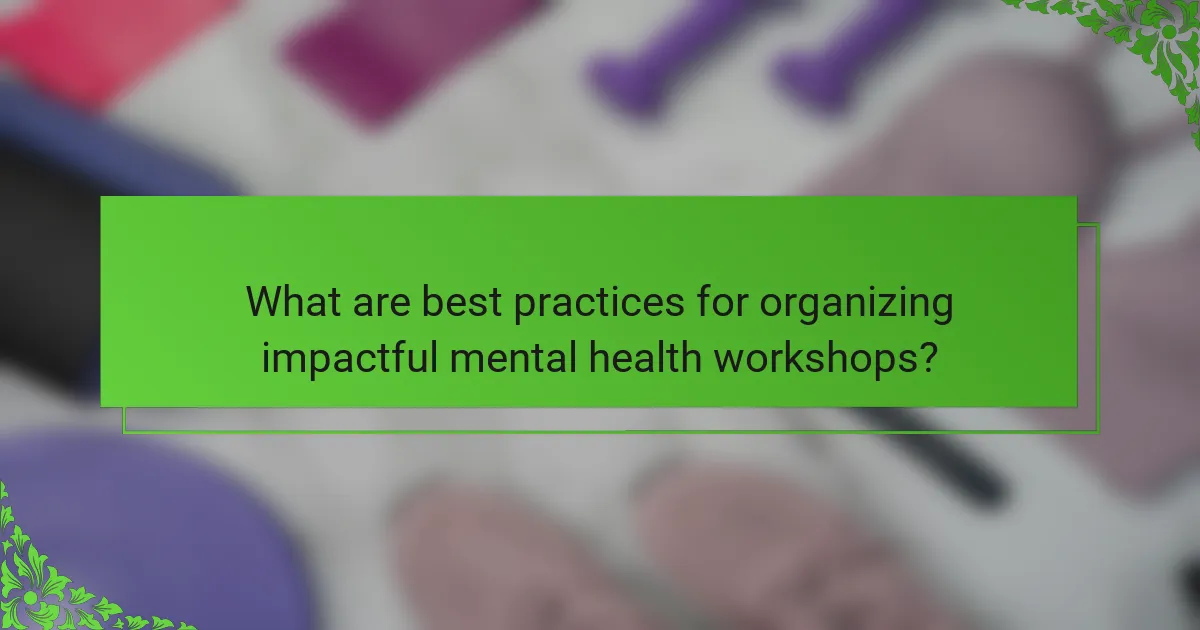
What are best practices for organizing impactful mental health workshops?
To organize impactful mental health workshops, focus on clear objectives, engaging formats, and community involvement. Start by defining specific goals for the workshop, such as raising awareness or providing coping strategies. Use interactive methods like group discussions and activities to foster participation. Collaborate with local mental health professionals to ensure credibility and relevance. Finally, gather feedback post-workshop to assess effectiveness and improve future events.
How can feedback be effectively integrated into future workshops?
Feedback can be effectively integrated into future workshops by systematically analyzing participant responses and adjusting content accordingly. Collect feedback through surveys or discussions to identify strengths and areas for improvement. Use insights to refine workshop structure, enhance engagement strategies, and tailor topics to meet community needs. Regularly revisiting past feedback ensures continuous improvement and relevance in mental health workshops, ultimately maximizing their community impact.
What common mistakes should organizers avoid when planning workshops?
Organizers should avoid common mistakes that can undermine the effectiveness of mental health workshops. Key pitfalls include neglecting participant needs, failing to create a safe environment, and overlooking the importance of skilled facilitators.
1. Ignoring participant feedback can lead to irrelevant content and disengagement.
2. Not addressing emotional safety may prevent open discussions, crucial for mental health topics.
3. Underestimating the role of qualified facilitators can diminish workshop quality and impact.
4. Skipping logistical planning may result in technical issues or inadequate resources.
5. Failing to follow up can limit community impact and ongoing support for participants.
By addressing these mistakes, organizers can enhance the overall success and benefits of mental health workshops.
Which resources can support ongoing mental health education in communities?
Mental health education in communities can be supported through various resources. These include local mental health organizations, online platforms offering workshops, educational materials, and community centers hosting events.
1. Local mental health organizations provide tailored workshops focusing on community needs.
2. Online platforms offer accessible mental health education through virtual workshops and webinars.
3. Educational materials such as brochures and guides can enhance understanding of mental health topics.
4. Community centers often host events that facilitate discussions and promote awareness.
5. Schools and universities can implement programs that educate students and staff on mental health issues.
6. Peer support groups create safe spaces for sharing experiences and learning from one another.
These resources collectively foster ongoing mental health education and promote community well-being.
